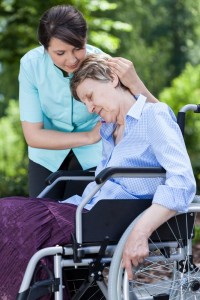Q: My loving, Jewish mother is 92 and has turned into a rude, abusive foul-mouthed woman who I no longer recognize.
She’s in relatively good health and amazingly lives in the same house I grew up in. She has an aide during the day. She won’t leave the house,treats the aide poorly and last weekend cursed out my very patient spouse. We’ve been getting 5 calls a day such as ” I”m having a heart attack; no one will tell me whether recycling comes today”!
I know she has early signs of dementia. Her cardiologist tells me not to take it to heart and this is not the same women who raised me. She won’t go to the JCC adult programs, complains about being lonely at night, yet hangs up on me when I tell her we can get an aide at night or sell the home and let her live in a facility with women her age, etc. She threatens to call the Police if someone comes to her home at night. I have a POA but don’t want to rob her of her independence at 92. I try to tell her to speak nicely to the aides, myself, my spouse, but she says ” I don’t remember or I must have reacted to something someone did or said.”
I feel guilty as I’m not spending as much time with her as I would like, but it’s a matter of survival. Jewish guilt is thrown about with impunity and I can’t tell whether she’s being manipulative and obsessing over bullshit ( “oh my God the outside light may burn out tonight” ) or she really can’t control herself. Her aide is a lovely human being but my mom orders her around like a slave. Who is this woman? I’m torn, anguishing over what to do and am doing nothing but try to correct her inappropriate behavior and language. I wanted to take her to a geriatric psychiatrist but she refused to go. Medication to calm her down is dangerous per the MD as she could fall, etc.
What should I do? I’m at my wits end.
Dr. K’s answer:
Wow, difficult situation but unfortunately not uncommon.
You say your mother has early signs of dementia, and it is true that “personality changes” can be due to an underlying dementia, such as fronto-temporal dementia or Alzheimer’s, especially if a family notices other changes in memory or thinking abilities.
But it doesn’t sound like your mother’s been clinically evaluated for dementia, and you don’t say whether this has been brought up with her primary care doctor.





